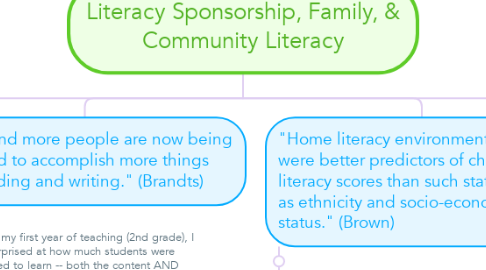Literacy Sponsorship, Family, & Community Literacy
por Kailey Davis


1. "More and more people are now being expected to accomplish more things with reading and writing." (Brandts)
1.1. During my first year of teaching (2nd grade), I was surprised at how much students were expected to learn -- both the content AND how they needed to show their work. I felt like these 2nd graders were doing things I was learning about in 5th grade!
1.2. WHEN DID THE EXPECTATIONS CHANGE?! Did elementary expectations change so drastically during my 4 years of college? I'm only in my third year of teaching and I feel that so much has changed since I was a student.
1.3. The expectations are rising quickly, but I can't keep up with the demands placed on my students. This is even more frustrating because the students I work with aren't performing on grade-level, yet everyone is moving on without them.
2. "Out of school settings are an important context for this work because research has shown that these alternative knowledge spaces are where literacy learning is authentic and purposeful for multiple generations for people of color." (Fisher)
2.1. This made me think of an article from Theme 1 about assessments. The article mentioned something about students being able to think and come to solutions in different ways, but the test only assesses a specific way.
2.2. Does this relate to Project Based Learning? More authentic learning experiences last longer and make a bigger impact.
2.3. As a teacher, I need to get in the habit of providing more authentic learning experiences for my students. I often stick the programs we use, hesitant to stray, but after reading this article I want to know: how can teachers provide the rich experiences that children may receive outside of school in a school setting? How can we blend the two settings?
3. "Home literacy environment measures were better predictors of children's literacy scores than such static factors as ethnicity and socio-economic status." (Brown)
3.1. This statement reminds me of the phrase, "It's not where you start, it's where you finish" (or something similar) because being raised a neighborhood that is poor or being a certain race doesn't guarantee how successful you are.
3.2. I've worked with students from run-down neighborhoods, some were very bright while others struggled; that tells me that it's about what happens at home, not necessarily where your home is.
3.2.1. How can we get families to break through the stereotypes of being "inadequate" in literacy and to work with their child(ren) at home?

